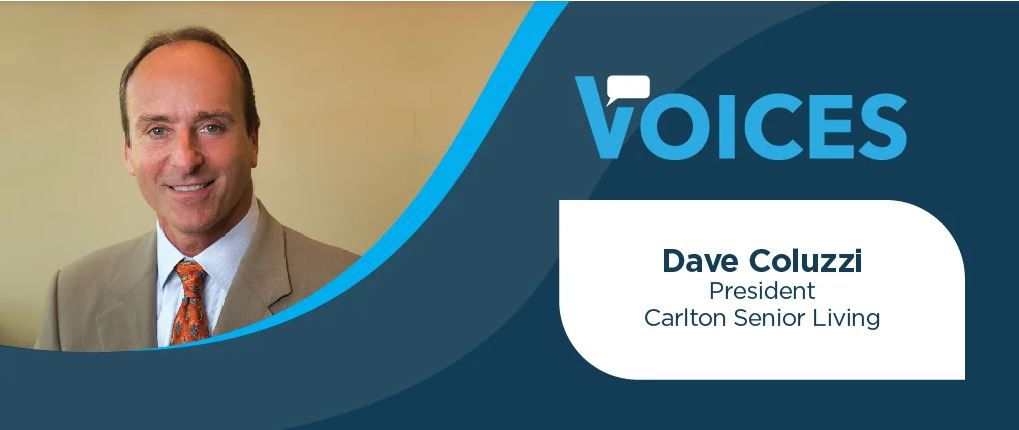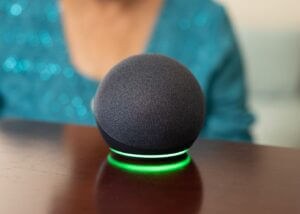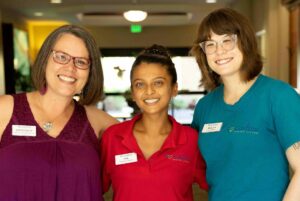Dave Coluzzi on Working with Alexa Smart Properties at Carlton
This article is sponsored by Alexa Smart Properties. In the journey toward voice-enabled technology, senior living provider Carlton Senior Living has made major strides. Having first implemented Amazon Alexa devices in its communities prior to the COVID- 19 pandemic, the company today has seen major impacts both for residents and for staff.
![]()
SENIOR HOUSING NEWS | By Elizabeth Ecker

In this Voices Interview, Dave Coluzzi, Carlton President, sits down with Senior Housing News to share the experience of working with Alexa Smart Properties, including lessons learned, his advice to providers embarking on the journey toward voice-activation in senior living, and how Alexa devices have saved time — and many, many phone calls — across Carlton’s 11 Northern California-based communities.
What career experiences do you draw most from in your role today?
I started in the Air Force out of high school to get the GI Bill and attend college. I was an aircraft mechanic and crew chief. At a very young age, I learned that you must do things right because people depend on you, especially fighter pilots.
I got my degree in health care administration and took the accountability I learned in the Air Force with me. I started working in nursing homes, hospitals, rehab centers, and then I went into assisted living. I learned that to build a strong foundation, you must do the right thing from the beginning. I’ve repeatedly drawn on that for the 30-plus years I’ve been in the business.
Tell me about your experience in working with voice-enabled technology, or specifically Alexa Smart Properties.
We began collaborating with Amazon and Speak2 almost three years ago. I wanted to utilize technology in assisted living much faster than what we were seeing. We made the determination that we wanted to get voice-activated technology in all our communities. Simply put, every resident in our community has an Alexa device. The first phase was giving them simple phrases to ask Alexa, like, “What’s the weather like?” and things like that.
Read More: Carlton Innovated By Equipping All Residents with Amazon Alexas
Then, it started to morph into a lot more. A challenge within assisted living is the consumption of time for staff to react to questions and emergencies for residents. Our industry is antiquated. We were only using a pull-cord and pendant system, like nursing homes back in the day. We needed a major update.
It’s funny, because I speak to residents quite a bit at resident council meetings. In the beginning, they would say, “Dave, you’re understaffed; it takes forever to get somebody here. We push our button, and nobody comes.” Looking into it, we found that residents would use their pendant for non-emergencies, like when their TV remote control batteries are low. The problem was that we could not tell which calls were emergencies and which weren’t. We were not triaging correctly, so staff were tied up responding to less urgent calls when other residents needed more immediate attention.
I wanted residents to be able to use Alexa to request help in emergencies and to reduce the number of non-emergency calls to staff. Alexa has helped us triage those situations and has improved efficiency.
Is there anything that surprised you about the experience of rolling this out?
The surprise was that we provided all these Amazon Echo Dots, but not everybody used them. Adoption isn’t 100%, but this is very similar to society at large. Not everybody uses this technology. I found that even if you have this great idea, you really need champions. We had real advocates in the community, and those champions kept the momentum going and engaged other residents to use the devices. As we’ve built more and more Alexa skills, we have realized that our imagination is the only limiting factor.
How does the technology serve residents in the community? Specifically, what types of commands are you finding that they utilize most, and how does it support them?
The number one thing that residents wanted to know was when the mail was delivered. That was probably 80% of calls to the front desk: “Is the mail in?” Although it seemed like a minor issue, it took a lot of time away from the front desk staff, who had to handle so many calls. As a solution, their Alexa-enabled device now says, “The mail’s in,” and they no longer need to call the front desk.
The second most common question is about the dining menu. With the Alexa-enabled device, residents can now order lunch or room service without calling the front desk or the kitchen.
One of the most critical requests for safety is asking Alexa for immediate care. There have been instances where residents who fell could not crawl to the bathroom to pull the call button. In such situations, all they had to do was say, “Alexa, I need care,” and care staff could prioritize their safety over other requests quickly and easily.
Read More: Carlton Senior Living Enhances Senior Care Through Groundbreaking Collaboration with Amazon
How does it specifically serve staff? Do staff recognize the benefits?
Alexa has helped our staff with efficiency. Now, a Care Partner can go into a resident’s apartment and say, “Dorothy, it’s time to start your day.” That triggers Speak2 to record that I now am providing Dorothy’s morning care. In 45 minutes, when the staff is finished providing care, they can say, “Dorothy, enjoy your day.” That closes the loop on the visit, and Speak2 can show that the care staff provided 45 minutes of care. Not only does this help with tracking care for billing purposes, but it also reduces the time care staff had previously spent documenting care by hand.
It’s very efficient, and we can find out if we’re spending more time with a resident and we should charge accordingly or if we’re spending less and reducing their charges.

How are you measuring the effectiveness of this rollout? Could you share any outcomes that you’ve measured?
Following the rollout of our Alexa-enabled devices, there were two key outcomes. The first is our ability to keep track of all our announcements since we do thousands of them a day per community — that shows that we are constantly communicating with our residents. We can also passively check in on residents by usage with prior authorization from the resident. If a resident interacts with the device, we don’t have to send a staff member to their apartment just to check in (unless they ask us to), which saves staff time and provides a better experience for the resident.
Secondly, the time staff takes to respond to an emergency has decreased considerably because we now know when something is an emergency. Our staff has more time to provide care since they spend their time on things other than running around the halls answering pull cords. We are saving 20% of our time just like that. Our overtime has gone down, plus the staff like this process, so they’re more willing to come to work. Being a Care Partner is a hard job; anything we can do to make their life easier with technology helps them.
Overall, overtime is decreasing, staff retention is good, morale is excellent, and the perception from residents and families is impressive. We get high marks like that — I think it’s all because of Alexa.

Read More: Carlton Wins the GOLD for McKnight’s Excellence in Technology Awards for Innovator of the Year
Do you have any advice for other providers that might be just starting this journey with voice-enabled technology?
My advice is jump in. Technology’s not going away. Anything that’s going on out in the world, you should be implementing inside your community.
In a couple of words, finish the sentence: “In 2023, the senior living industry has been defined by— “
Pandemic. What I love about our industry, especially our company, is that we’re resilient. We didn’t lose staff. We didn’t lose any executive directors or managers. It’s a very rewarding industry. It’s not going away.
________
Editor’s note: This interview has been edited for length and clarity.
Alexa Smart Properties provides device fleet management to provide Alexa capabilities at scale. Residents can use the Alexa service to easily access information and communicate, helping them to lead more independent and socially engaged lives. At the same time, Alexa helps to enable staff to focus on high-impact areas by creating greater efficiencies with resource-consuming activities such as, check-ins, announcements, and maintenance service requests. Alexa technology streamlines associates’ workflows and provides more quality time for resident care. To learn more, visit: https://developer.amazon.com/en-US/alexa/seniorliving
The Voices Series is a sponsored content program featuring leading executives discussing trends, topics and more shaping their industry in a question-and-answer format.